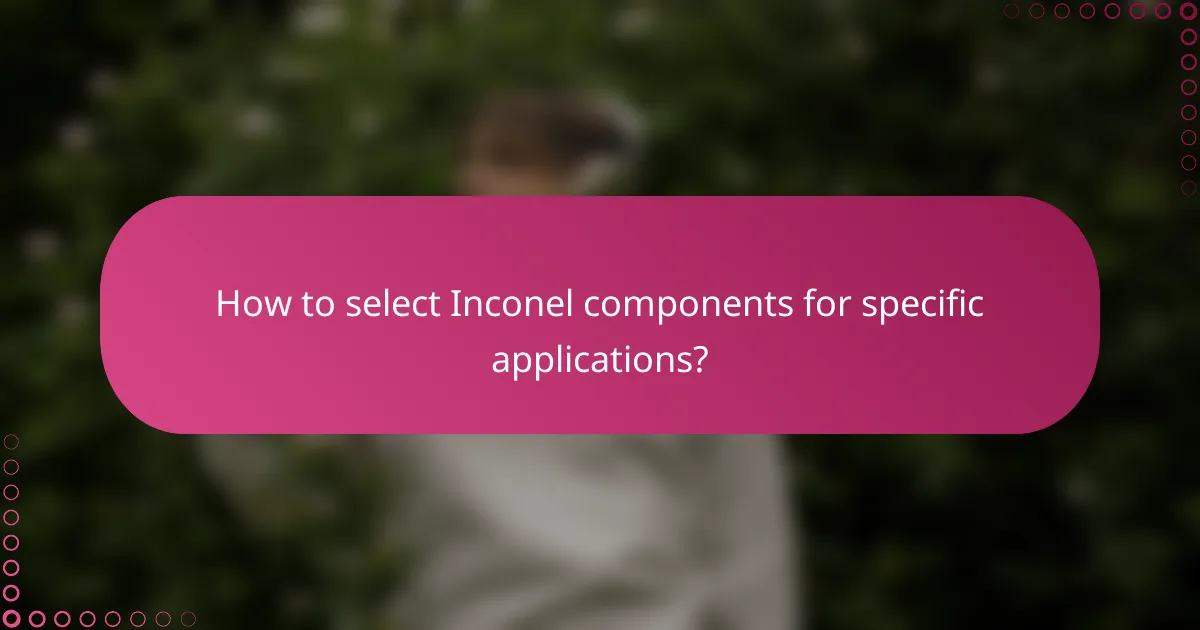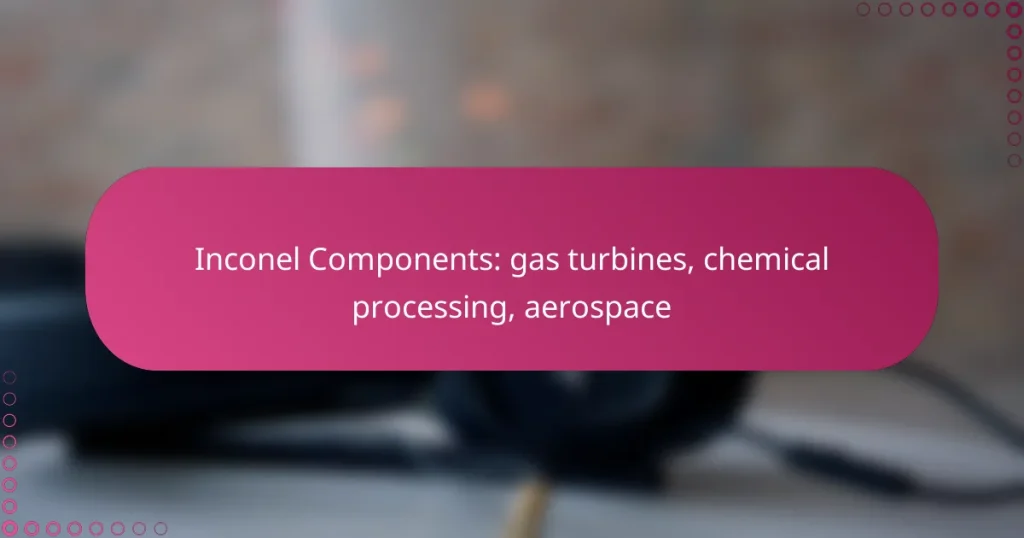Inconel components play a vital role in various high-performance industries, including gas turbines, chemical processing, and aerospace. Their remarkable ability to withstand extreme temperatures and corrosive environments ensures enhanced efficiency and longevity in applications such as turbine engines and chemical equipment. This makes Inconel an indispensable material for maintaining reliability and performance in demanding conditions.

What are Inconel components used for in gas turbines?
Inconel components are crucial in gas turbines due to their ability to withstand extreme temperatures and corrosive environments. These high-performance alloys enhance the efficiency and longevity of turbine engines, making them essential in aerospace and power generation applications.
High-temperature resistance
Inconel alloys are designed to perform reliably at elevated temperatures, often exceeding 1,000°C (1,832°F). This high-temperature resistance is vital for gas turbines, where components like turbine blades and combustion chambers experience intense heat. The alloys maintain their strength and structural integrity, preventing deformation and failure during operation.
When selecting Inconel for high-temperature applications, consider the specific alloy grade, as different grades offer varying levels of thermal stability. For instance, Inconel 718 is commonly used for turbine components due to its excellent mechanical properties at high temperatures.
Corrosion resistance
Inconel’s resistance to oxidation and corrosion makes it ideal for gas turbines operating in harsh environments. The alloy forms a protective oxide layer that shields it from corrosive gases and chemicals, extending the lifespan of critical components. This property is particularly important in applications involving high humidity or exposure to saltwater.
To maximize corrosion resistance, ensure proper alloy selection based on the specific operating conditions. For example, Inconel 625 is often preferred in environments with high chloride levels due to its superior resistance to pitting and crevice corrosion.
Structural integrity
Maintaining structural integrity under stress is essential for the safety and efficiency of gas turbines. Inconel components are engineered to withstand mechanical loads and thermal cycling without compromising performance. This durability helps prevent catastrophic failures that could lead to costly downtime or safety hazards.
When designing turbine systems, consider the mechanical properties of Inconel, such as yield strength and fatigue resistance. Using the right alloy can significantly enhance the overall reliability of the turbine, ensuring it operates effectively over its intended lifespan.

How do Inconel components benefit chemical processing?
Inconel components offer significant advantages in chemical processing due to their exceptional durability, resistance to corrosive substances, and stability under extreme temperatures. These properties make Inconel an ideal choice for equipment used in harsh chemical environments.
Enhanced durability
Inconel is known for its remarkable durability, which allows components to withstand the rigors of chemical processing without significant wear. This durability translates to longer service life and reduced maintenance costs, making it a cost-effective choice in the long run.
For example, Inconel valves and pumps can operate effectively in high-stress environments, reducing the frequency of replacements. This reliability is crucial in industries where downtime can lead to substantial financial losses.
Resistance to harsh chemicals
Inconel components exhibit excellent resistance to a wide range of corrosive chemicals, including acids and alkalis. This resistance helps prevent degradation and failure, ensuring that equipment remains operational even in aggressive environments.
When selecting materials for chemical processing, consider the specific chemicals involved. Inconel can handle many harsh substances, making it suitable for applications in petrochemical, pharmaceutical, and food processing industries.
Temperature stability
Inconel maintains its mechanical properties and structural integrity at elevated temperatures, which is vital in chemical processing where heat is often a factor. This temperature stability ensures that components do not warp or lose functionality under thermal stress.
For instance, Inconel can perform well in environments exceeding 1000°F (538°C), making it ideal for high-temperature applications like reactors and heat exchangers. Using materials that can withstand such conditions minimizes the risk of failure and enhances overall safety in processing operations.

What role do Inconel components play in aerospace applications?
Inconel components are crucial in aerospace applications due to their exceptional resistance to high temperatures and corrosion. These properties make them ideal for use in environments such as jet engines and other high-performance aerospace systems.
Weight reduction
Weight reduction is a significant advantage of using Inconel in aerospace applications. By replacing heavier materials with Inconel, manufacturers can create lighter components without sacrificing strength. This reduction in weight contributes to improved fuel efficiency and overall performance of aircraft.
For instance, using Inconel in turbine blades can lead to a decrease in overall engine weight, which is critical for enhancing aircraft range and payload capacity.
High strength-to-weight ratio
Inconel boasts a high strength-to-weight ratio, making it an excellent choice for aerospace components that require both durability and lightweight characteristics. This property allows engineers to design parts that can withstand extreme conditions while minimizing added weight.
Components such as exhaust systems and structural elements benefit from this ratio, as they can endure high stress and temperatures without compromising the aircraft’s structural integrity.
Fatigue resistance
Fatigue resistance is another key feature of Inconel components, which is essential in aerospace applications where parts are subjected to cyclic loading. Inconel’s ability to resist fatigue failure extends the lifespan of critical components, reducing the need for frequent replacements.
For example, Inconel is often used in gas turbine engines where components experience repeated thermal and mechanical stresses. This resistance helps maintain performance and safety standards over time, aligning with aerospace regulations for reliability.

What are the key specifications of Inconel alloys?
Inconel alloys are high-performance materials known for their excellent resistance to extreme temperatures and corrosion. These specifications make them ideal for applications in gas turbines, chemical processing, and aerospace industries.
Alloy composition
Inconel alloys are primarily composed of nickel, chromium, and iron, with varying amounts of other elements such as molybdenum, niobium, and titanium. The specific composition can differ depending on the alloy grade, which influences its properties and suitability for particular applications. For example, Inconel 625 contains around 58% nickel and 20% chromium, making it highly resistant to oxidation and corrosion.
Mechanical properties
The mechanical properties of Inconel alloys include high tensile strength, excellent fatigue resistance, and good ductility. These characteristics allow them to maintain structural integrity under high-stress conditions, such as those found in gas turbines and aerospace components. Typically, Inconel alloys can withstand temperatures ranging from 600°C to over 1000°C, depending on the specific alloy.
Thermal properties
Inconel alloys exhibit exceptional thermal stability, which is crucial for applications involving extreme heat. They have low thermal conductivity, which helps in maintaining temperature control in high-temperature environments. Additionally, their thermal expansion properties are designed to minimize stress during temperature fluctuations, making them reliable for use in aerospace and chemical processing industries.

How to select Inconel components for specific applications?
Selecting Inconel components for specific applications involves understanding the unique requirements of each application, the environmental conditions they will face, and the associated costs. By carefully evaluating these factors, you can ensure optimal performance and longevity of the components in demanding environments.
Application requirements
Each application has distinct requirements that dictate the choice of Inconel components. For instance, gas turbines may require components that withstand high temperatures and pressures, while chemical processing applications might prioritize corrosion resistance. Identifying the specific mechanical and thermal properties needed is crucial for effective selection.
Consider the operational parameters such as load, speed, and temperature range. Components must be designed to handle these conditions without failure. For example, Inconel 625 is often used in marine environments due to its excellent resistance to pitting and crevice corrosion, making it suitable for offshore applications.
Environmental conditions
The environmental conditions in which Inconel components operate significantly influence their performance. Factors such as temperature extremes, corrosive atmospheres, and mechanical stress can affect material integrity. For example, Inconel 718 is commonly used in aerospace applications where it is exposed to high temperatures and oxidizing environments.
Assessing the specific environmental factors is essential. Components exposed to saltwater may require higher corrosion resistance, while those in high-temperature applications may need to maintain strength at elevated temperatures. Understanding these conditions helps in selecting the right Inconel alloy.
Cost considerations
Cost is a critical factor when selecting Inconel components, as these materials can be significantly more expensive than alternatives. It is important to balance the initial investment with the expected performance and lifespan of the components. While Inconel may have a higher upfront cost, its durability can lead to lower maintenance and replacement costs over time.
When evaluating costs, consider not just the material price but also the manufacturing processes and any potential savings from reduced downtime. Conducting a cost-benefit analysis can help determine if the higher initial expense is justified based on the application’s demands and the expected return on investment.

What are the leading manufacturers of Inconel components?
The leading manufacturers of Inconel components are known for their expertise in producing high-performance alloys used in demanding applications such as gas turbines, chemical processing, and aerospace. These companies focus on quality, innovation, and meeting industry standards to ensure reliability and efficiency in their products.
Special Metals Corporation
Special Metals Corporation is a prominent manufacturer specializing in nickel-based alloys, including various grades of Inconel. They are recognized for their extensive product range and commitment to quality, serving industries such as aerospace and power generation.
The company emphasizes innovation and has developed proprietary processes to enhance the performance of their alloys. Their products are often used in high-temperature and high-stress environments, making them a preferred choice for critical applications.
Haynes International
Haynes International is another leading producer of Inconel components, focusing on high-performance alloys for extreme environments. Their materials are widely utilized in the aerospace and chemical processing sectors, where resistance to heat and corrosion is essential.
Haynes offers a variety of Inconel grades tailored to specific applications, ensuring that customers can find the right material for their needs. Their commitment to research and development allows them to stay at the forefront of alloy technology.
Alloy Wire International
Alloy Wire International specializes in the manufacture of wire, bar, and strip products made from Inconel and other nickel alloys. They cater to a diverse range of industries, including aerospace, automotive, and medical, providing customized solutions to meet specific requirements.
The company prides itself on its ability to deliver high-quality products with quick turnaround times. Their extensive inventory and expertise in alloy composition enable them to support both small and large-scale projects effectively.


